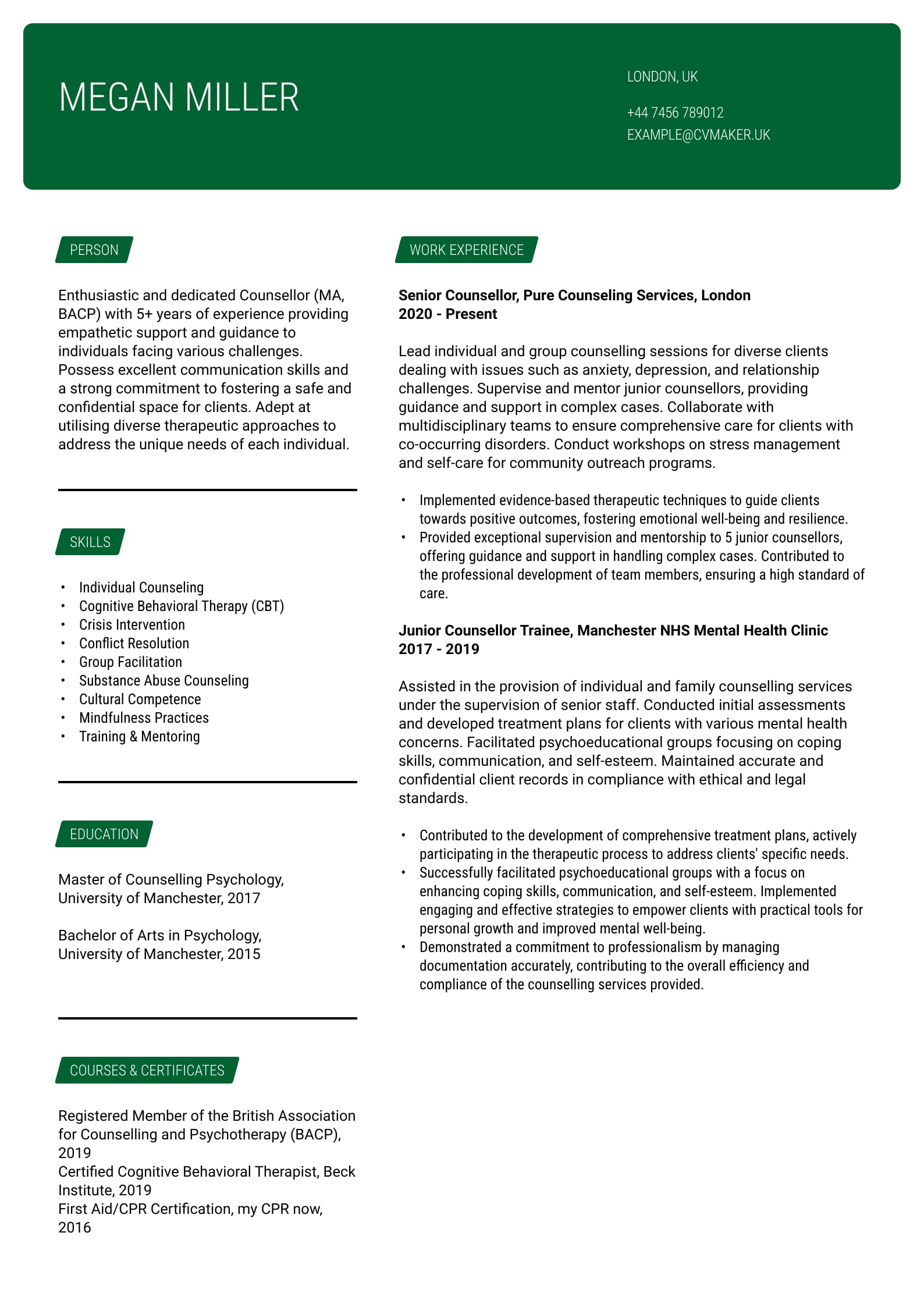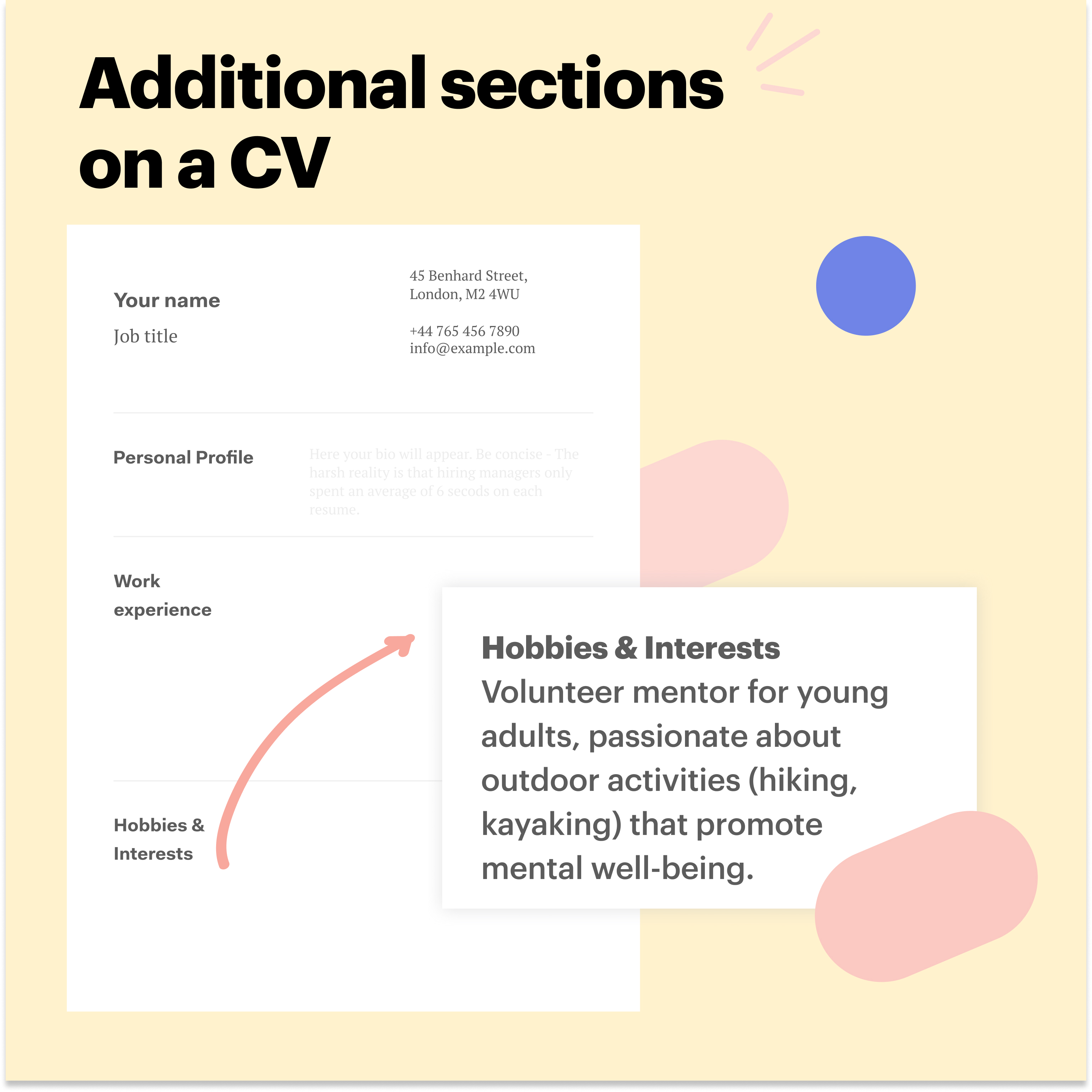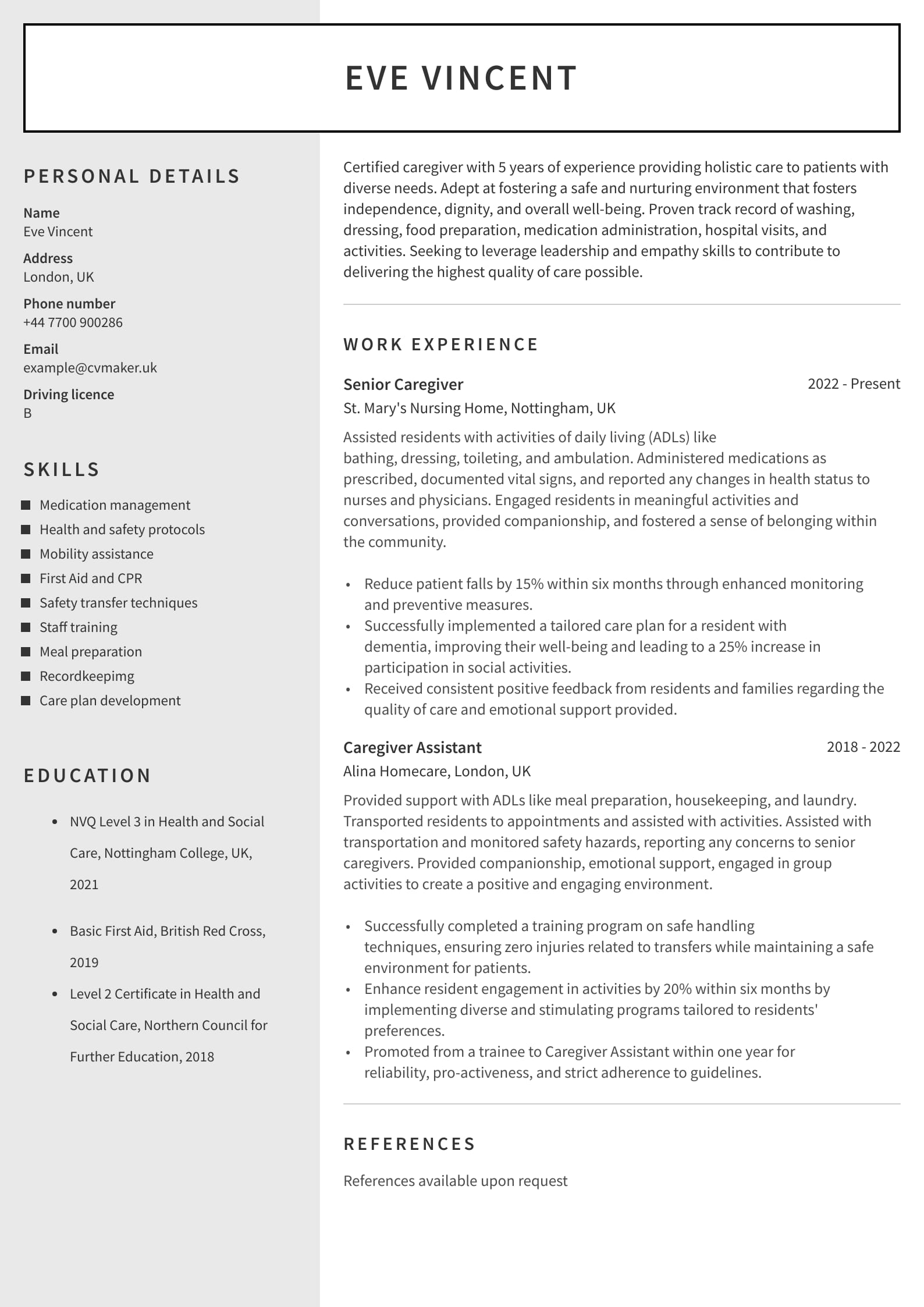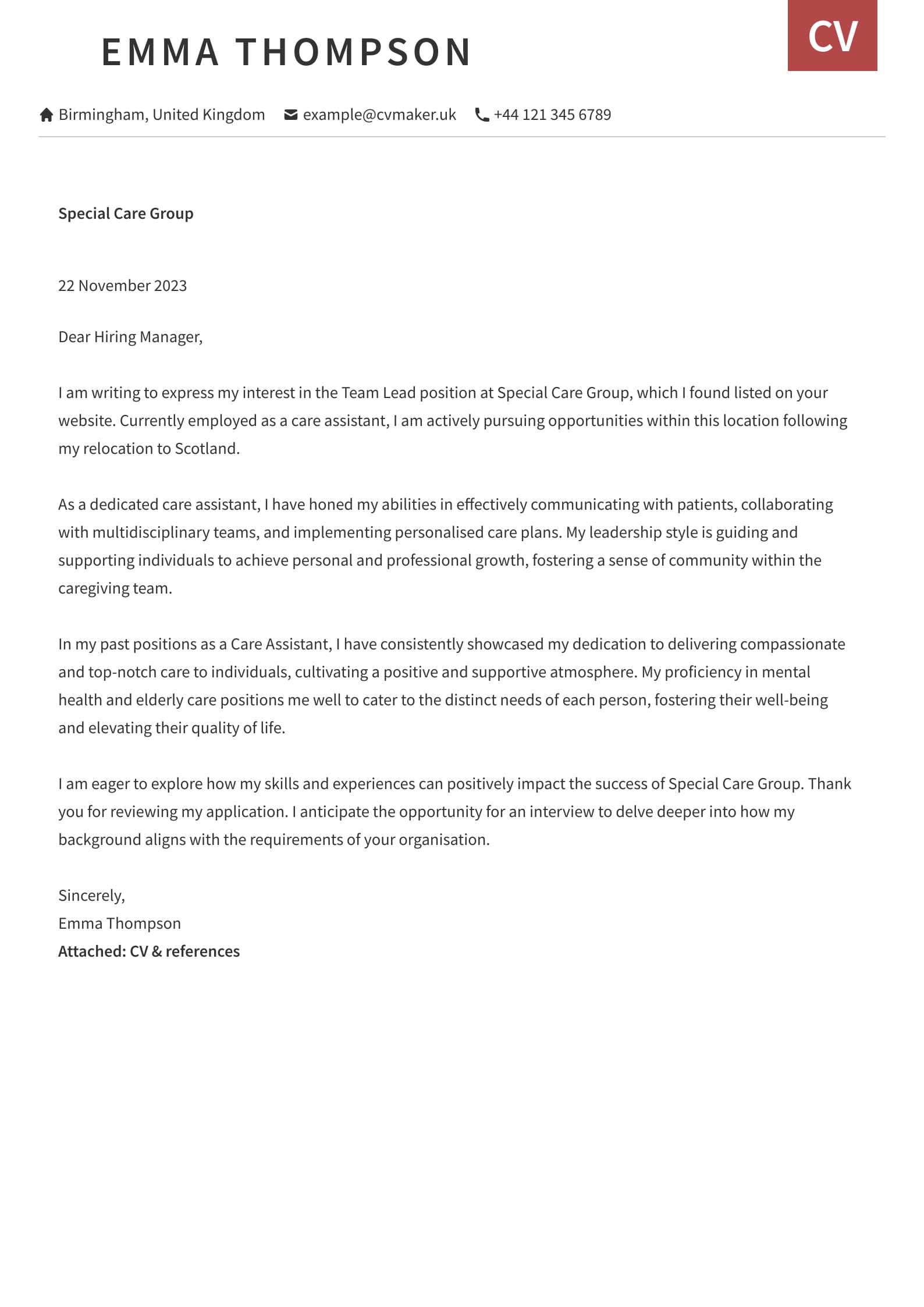
How to Write a Counsellor CV: Examples and Tips
Counsellors provide structured emotional support in communities across the UK, offering a safe space for individuals to explore their feelings and challenges. This role is ideal for those with a natural ability to listen, empathise and maintain confidentiality.
Skilled counsellors are in demand across a range of professions like teaching, academia, healthcare, police, and even sports. Their expertise in guiding individuals through personal and emotional issues is invaluable, making a critical contribution to mental health and well-being.
A modern CV is your tool to cut through the competitive UK job market and make a great first impression as a counsellor. In this article, we show you how to write a good CV with practical advice and a ready-to-go CV template you can use in your next application.

Counsellor CV example

Megan has opted for the professional Cornell CV template. This clear and concise two-column layout effectively showcases both skills and experience whilst leaving plenty of room for an eye-catching personal profile, references and additional achievements.
What to include in a counsellor CV?
Similar to psychotherapy and support work, counsellors need to be committed to their calling. Be concrete about which aspect of the profession you want to pursue, be it bereavement, relationships, addiction, child services and so on. Before putting pen to paper, consider the following questions:
What relevant experience do I have?
What are my long-term career aspirations?
What specific skills and experiences do I possess?
What industries or topics am I most passionate about?
Once you have this nailed down, it’s time to start sketching out your CV sections.

When starting the CV writing process, begin by making a master CV. This document containing your collected skills, education and experience acts as a consistent starting point and helps save time creating job-specific applications later on. Typically your master CV should include:
Personal details
Personal profile
Work experience
Skills
Education
Keep in mind that, depending on the field, aspiring counsellors may need to include further information such as a full driving licence, additional languages, professional registrations and an enhanced background check.
Looking for inspiration for the perfect cover letter? Take a look at our care worker cover letter template for inspiration.
What should a CV for a counsellor with no experience include?
If you are just starting your journey as a counsellor, there are ways to not over-promote your limited experience. Be sure to include the staple sections mentioned above, whilst highlighting volunteer work with organisations such as Samaritans, Relate, The Red Cross or Cruse.
Including references on a CV plays an important role here. Include sections emphasising soft skills such as empathy, active listening and the ability to stay calm or positively challenge clients if needed. Refer to our simple CV example for more inspiration.
Support your volunteer experience and in-demand soft skills with a concise overview of formal education, drawing attention to any health or support work modules or qualifications. Consider a skills-based CV format to effectively showcase your capability for the role.

How to write a counsellor CV: 5 Steps with examples
1. How to include education on a counsellor CV
Listing your formal education on a CV in reverse chronological order shows you have the relevant knowledge to complement your life experience and professional skills.
The role of counsellor in the UK is accessible to people from a wide range of backgrounds. In most cases, high school qualifications such as GCSEs or a recognised college diploma are enough to begin further training in psychotherapy or counselling.
Format your qualifications with the name of the institution, the awarding body (not required for GCSEs) and the date of completion.

Including GCSE certificates:
Bridgetown School | Bradford, 2019 - 2024
Maths: Grade 4 (C), English: Grade 5 (B), Combined Science: Grade 4 (C), Sport Science: Grade 4 (C), Food and Nutrition: Grade 6 (B)
Including N5 certificates (Scotland):
Lennox High School | Aberdeen, 2017 - 2022
Scottish N5s: English C (4), Maths C (4), Science B (6), Sociology B (5), Art & Design C (4), English Language B (6) — GCSE level equivalent in brackets.
Including a college diploma:
Level 3 ABC Certificate in Counselling Skills, Eastleigh College, 2024
Including further counsellor certification:
Certified Cognitive Behavioural Therapist, Beck Institute, 2019
2. What are the important skills for a counsellor to have on a CV?
Listing skills on your CV is a critical step in showcasing your qualifications and suitability for a counsellor role. It gives employers a snapshot of your abilities and how they align with the job requirements.
Similar to other people-focused roles such as nurse, midwife or nanny, it’s important to emphasise your soft skills within real-life scenarios, showing how they've been applied in practice while giving learned hard skills the attention they deserve.
Do this by highlighting soft skills - qualities demonstrating your interpersonal and emotional intelligence when establishing rapport with clients - within your personal profile and work experience sections. Learn more about the top skills employers are looking for.
Hard skills, on the other hand, should be listed under a dedicated heading, providing a clear and concise overview of your technical abilities and training relevant to counselling.
Nowadays, there are more and more opportunities to work remotely as a counsellor. If a work from home counsellor job is something you are interested in pursuing, be sure to showcase how you can successfully connect remotely with those who need support.

5 essential skills for a counsellor
Active listening: The ability to fully concentrate, understand, respond to and remember what is being said by clients.
Empathy: The capacity to recognise, understand and share the feelings of others, helping clients feel understood and supported.
Communication: Skilled in both verbal and non-verbal communication, ensuring clear, effective exchange of information and emotional support.
Problem-solving: Ability to guide clients through challenges, helping them explore solutions and new perspectives on their issues.
Confidentiality: Maintaining privacy and discretion with client information, creating a safe and trustful environment for therapy.
| Soft skills | Hard skills |
|---|---|
| Emotional intelligence | Psychological assessment |
| Adaptability | Crisis intervention |
| Patience | Behavioural therapy techniques |
| Resilience | Record keeping |
| Cultural competency | Mental health law knowledge |
Take a look at the social worker CV example for additional skills you could add to your CV.
3. How to write a personal profile for a counsellor CV
A personal profile on a CV gives employers a snapshot of your key qualities, area of expertise, level of experience and notable soft skills.
Similar to other service-orientated roles such as caregiver, care assistant or customer service, this short text at the top of your CV is an excellent way to quickly convey the soft skills you feel most define your working style, alongside professional experience and relevant personal qualities.

This is also a good opportunity to underscore transferable skills from other professions such as confidentiality, critical thinking and leadership.
Pro Tip
Personal profiles should be succinct, direct and free of pronouns, ideally not exceeding 70 words in length.
Trainee counsellor CV personal profile example
Dedicated trainee counsellor with 1 year of experience in a supportive role, offering strong foundational skills in active listening and empathy. Committed to professional development with a focus on completing a BACP-accredited counselling course. Possesses a genuine passion for helping others, excellent communication skills and a proactive approach to learning therapeutic techniques.
Student counsellor CV personal profile example
Compassionate student counsellor with over 3 years of experience providing emotional support and guidance in educational settings. Skilled in addressing academic stress, personal challenges and mental health issues. Holds a Master’s degree in Counselling Psychology and excels in creating a trusting environment through empathy, confidentiality and adaptability. Demonstrates a strong commitment to student well-being and academic success.
Counsellor CV personal profile example
Experienced counsellor with 5+ years of practice in mental health care environments, specialising in cognitive-behavioral therapy and stress management. Certified in psychological first aid and adept at fostering resilience in clients facing life transitions and challenges. Known for a patient-centred approach, excellent interpersonal skills and the ability to build rapport quickly. Committed to continuous learning and professional growth in therapeutic practices.
4. How to include practical work experience
Including practical work experience on your CV demonstrates your hands-on expertise and ability to apply counselling techniques in real-world settings. Done well, this section should provide a clear indicator of your skills, effectiveness and adaptability in various contexts.
For many counselling is a second or parallel career. If you have a varied work history, leverage transferable skills by including work experience from other jobs. For example, if you have experience in a call centre, emphasise communication or empathy skills in this section.
When formatting each work experience entry, begin with a concise paragraph outlining core responsibilities and tasks, followed by two quantifiable achievements, giving employers an insight into your results-oriented approach.
What should each work experience entry include?
Job title of current or previous role
Organisation name and location
Dates of employment (month/year)
A concise paragraph detailing your duties
Followed by 2–3 bullet points that highlight your key achievements or measurable impact.
Learn more about the work experience section in a CV.
Student counsellor | University Counselling Center, Reading | 2021 - Present
Provide emotional and academic support to students facing stress, anxiety and transitional issues, utilising active listening and empathy. Collaborate with faculty to integrate support services, enhancing student well-being and academic success. Lead workshops on mental health awareness and stress management, promoting a culture of wellness across campus.
Conducted over 200 individual counselling sessions, significantly enhancing students' coping skills and academic resilience.
Spearheaded a peer support program, increasing student engagement in wellness activities by 40% and fostering a supportive community environment.
Trainee counsellor | Talking Therepies Clinic, Hartlepool | 2019 - 2020
Engaged with clients facing anxiety and depression, applying cognitive-behavioural therapy and mindfulness under supervision. Contributed to multidisciplinary team meetings, offering insights to inform care plans. Involved in community outreach to raise mental health awareness and service visibility.
Completed 150 hours of supervised counselling, achieving high client satisfaction and demonstrating effective application of therapeutic techniques.
Key contributor to developing and implementing an electronic record-keeping system, boosting case management efficiency by 30% and improving client follow-up.
Volunteer counsellor | HeadCam Mental Health Platform | 2023 - 2024
Offered remote support to individuals with mental health challenges, utilising digital communication tools to ensure a secure and empathetic counselling environment. Initiated and led virtual workshops on stress management and mindfulness, reaching a wide audience including underrepresented communities.
Delivered over 100 hours of online counselling, expanding service accessibility and supporting underserved populations.
Launched virtual stress management workshops, attracting an average of 50 participants per session and extending educational outreach.
Counsellor with little to no work experience
If you are entering the profession after graduation or during a career change, focus on the transferable skills you have accumulated during your studies or career to date. Counselling is a profession where life experience and skills developed in other professions are highly valued, so think laterally about using your existing experience to improve your CV.
Customer service representative | Feel Good Tech, Leeds | 2017-2019
Managed customer inquiries and complaints, providing timely and empathetic responses to ensure customer satisfaction. Developed strong communication skills and an ability to resolve conflicts effectively. Led training sessions for new hires on communication strategies and customer service excellence.
Resolved an average of 50 customer issues per week, maintaining a 95% customer satisfaction rating.
Implemented a feedback system that led to a 30% reduction in customer complaints over six months by identifying and addressing recurring issues.
5. Include additional sections if relevant
In a profession where personal traits and soft skills are seen as a plus, additional sections offer an opportunity to show your commitment to continuous learning. They provide evidence you are willing to develop both your professional skills and ability to connect with service users. If you're unsure what additional sections to include, refer to our blog on how long a CV should be for the type of role you are applying for.
Courses and Certificates
Highlighting relevant courses and certificates on a CV ties your application to specific therapeutic techniques or areas of counselling - a differentiator if applying in a niche area. This section shows professional development and a commitment to high standards of practice. Format your courses and certificates in reverse chronological order including the certificate name, awarding body and date.
Certified Cognitive Behavioural Therapy (CBT) - Institute of Counselling, 2021
Registered Member of the British Association for Counselling and Psychotherapy (BACP), 2019
Hobbies and Interests
Including hobbies and interests on a CV allows you to present aspects of your personality beneficial to counselling, such as empathy, patience and resilience. Hobbies that involve social interaction, leadership or support roles can underline your natural ability to engage and empathise with others.

How to write a counsellor CV with little to no experience
Writing a CV for a counselling role with little to no experience requires focusing on transferable skills, education and personal attributes that align with the job description. Below are a 6 brief tips on what to focus on for each CV section:
Personal profile: a compelling personal statement highlighting your understanding of the counselling role, your key soft skills and your passion for helping others.
Education: your educational background, emphasising courses or projects related to psychology or counselling. If you are about to graduate from a related degree mention it.
Relevant experience: Focus on roles that require interpersonal skills, empathy and communication. Use the format discussed previously to outline your experience.
Volunteer work and internships: Include volunteer positions, internships or extracurricular activities that demonstrate your interest in counselling and mental health.
Courses and certificates: Detail any additional courses, workshops or certificates you have completed that are relevant to counselling.
Hobbies and interests: Finish by drawing attention to leisure activities relating to good mental health such as sports, mindfulness and academic pursuits.
5 key takeaways
Create a master CV: Start by compiling an all-inclusive CV with skills, experiences and educational achievements, becoming a foundation for tailoring job-specific CVs later on.
Emphasise transferable skills: active listening, empathy and communication are crucial for counselling roles, even if these skills were developed in unrelated fields.
Highlight education and training: Detail any relevant qualifications, especially in psychology, social work or related fields.
Detail volunteer work: experiences related to helping or supporting others can significantly strengthen your CV.
Include additional sections: Courses and certificates, hobbies, and interests that demonstrate your commitment to personal development and mental health awareness can make your CV stand out.
Next steps?
Iron out any creases using our intuitive CV maker with 20+ CV templates and professional designs to choose from. To accompany your CV, discover our cover letter templates. If you don’t want to leave anything to chance, connect with our CVMaker professionals and use our CV Writing Service. Draw inspiration from our blog for tips on how to save time, emphasise important sections and make it easier for hiring managers to grasp your unique professional offer. To prepare for the next steps in your application read how to send your CV via email and take some time to research the good questions to ask in an interview.
FAQs
Are counsellors in demand UK?
Counsellors are in demand in the UK, particularly as the mental health impacts of the COVID-19 pandemic have increased the need for mental health support. There's been a significant rise in people seeking new or additional mental health support. Furthermore, there's been a 65% increase in demand for private counselling services since 2016.
What are the 10 roles of a counsellor?
The roles of a counsellor can vary widely but generally include providing a safe environment, listening to clients, empathising with their situations, helping them understand their issues, supporting them in finding solutions, maintaining confidentiality, providing emotional support, advocating for their clients, facilitating group sessions and continuing professional development.
What qualifications do you need to be a counsellor UK?
To become a counsellor in the UK, you typically need a diploma in counselling or psychotherapy including practical skills training and supervised work placements. Additionally, being registered with a professional body like the BACP (British Association for Counselling and Psychotherapy) is recommended for practising legally and ethically
How long does it take to become a counsellor UK?
To become a counsellor in the UK typically takes three to five years. You'll need to complete a diploma in counselling or psychotherapy as a minimum, with many professionals choosing to pursue a bachelor's or master's degree in the field.
What is a counsellor salary in the UK?
Counsellor salaries in the UK can start between £20,000 to £26,000 for entry-level positions. With experience, salaries can rise to between £30,000 and £40,000, and specialist roles can offer even higher salaries. The average salary for counselling jobs across various UK locations and industries is approximately £29,000.





)

)
